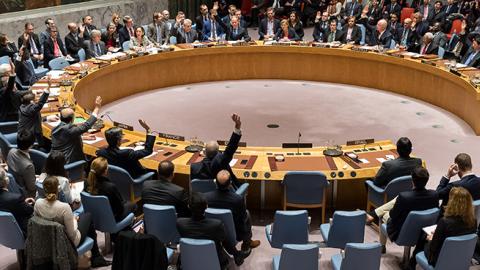This week marks six months since the passage of United Nations Security Council Resolution 2334, which classifies Israeli settlements beyond the 1967 line, including in the Jewish Quarter of Jerusalem, as illegal. Visiting Jerusalem last month, the distance between the pronouncements of Turtle Bay and the realities of the Old City appeared as stark as ever. For starters, everyone knows that Israel will absorb the major settlement blocs near the ’67 line as part of any peace agreement. And no Israel government will ever surrender its access to Jerusalem.
Alas, the United Nations has long been a hub of anti-Israeli activity, in part because it views the Israeli-Palestinian conflict as a colonial legacy pitting the powerful against the powerless. By pursing a one-sided agenda, the U.N. hopes to strengthen the weaker party in the service of justice. However, by issuing rulings on sensitive issues without first preparing the ground for peace, this approach only polarizes the Israeli-Palestinian confrontation. Just as bad, it damages the U.N.’s credibility with Israelis. Instead, the U.N. should switch tracks by focusing on the most important prerequisite for peace: cultivating trust.
Israel is a flourishing democracy that sees peace as crucial to maintaining its long-term Jewish identity. In meetings with Israelis of all stripes last month, their anguish at the plight of the Palestinians was palpable to me. Ever since the Second Intifada discredited the Israeli peace camp, however, Israelis have recoiled at major concessions that might imperil their security. If anything, the lesson Israelis have drawn from such initiatives as the withdrawal from Gaza is that the preconditions for a Palestinian state are a long way off. Put simply, the experiences of the past two decades have robbed Israelis of the trust needed to take a risk for peace. The result is that Israeli voters have repeatedly rewarded cautious leaders like Benjamin Netanyahu, who is on pace to challenge David Ben-Gurion as the longest serving prime minister in Israeli history.
The U.N. should focus on achieving a breakthrough by fostering the conditions needed for genuine peace. Unfortunately, at present the message for peace is not competitive with the call to violence among Palestinians. This has led the Palestinian leadership to spin a cocoon of anti-Israeli rhetoric from which it has been unable to escape. In 2000, for example, Yasir Arafat reportedly declined Ehud Barak’s generous offer of a Palestinian state by saying that he did not intend to drink tea with assassinated Egyptian President Anwar Sadat. If Palestinian leaders are serious about peace, they will need to prepare their people to accept a peace deal. At the very least, the U.N. should press the Palestinians to revamp their educational curriculum. Israelis can only be expected to take risks for peace if they are confident in their own security, which, in turn, depends on Palestinians developing healthier perceptions of Israel.
Ironically, U.N. Resolution 2334 comes fifty years after the Six Days War, the generating events of which included the withdrawal of U.N. forces from the Sinai in the face of an Egyptian military buildup. Then, as now, Israel concluded that the U.N. is no substitute for self-reliance. Even so, Israelis remain keenly aware of their status as a small power whose dispute with the Palestinians is bound up in larger regional politics.
For five decades, the U.S.-Israeli strategic relationship has been a bedrock of both Israel’s security strategy and U.S. power projection into the region. Israelis, therefore, interpreted the U.S. abstention on U.N. Resolution 2334 as a particularly stinging parting shot from the Obama administration as it left power. To Israel’s relief, the Trump administration has reversed course, tightly embracing Israel while forging an agreement to limit settlement construction to existing built-up areas. Moreover, the Trump administration is leveraging flourishing contacts between Israel and its Sunni Arab neighbors, which is sure to have a salutary effect on the peace process. This so-called “outside-in” effect envisions improved ties between Israelis and Arabs slingshotting Israel into improved relations with the Palestinians. If executed cautiously and deliberately while pushing for Palestinian reform, such an approach holds promise for contributing to regional stability.
The past two decades since Oslo have shown the futility of negotiating a quick resolution to the Israeli-Palestinian conflict. In the face of terrorism, Israelis have built walls and domes to defend themselves while waiting for Palestinian society to reform itself. The U.N. should dedicate itself to assisting Palestinians with that task, rather than issuing anti-Israeli screeds that work against the Trump administration’s search for peace.

















